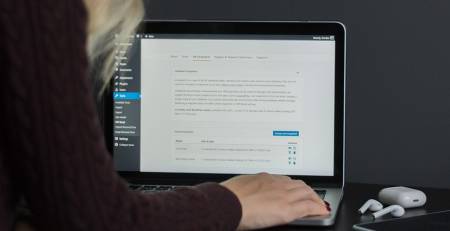In today’s digital age, a compelling online presence is crucial for the success of any business. Professional web design plays a vital role in shaping your website’s impact on your brand’s image and overall performance. When it comes to creating a website, businesses often face a fundamental decision: should they opt for a DIY (Do It Yourself) approach or hire a professional web designer? This article explores the pros and cons of each option to help you make an informed choice for your business.
Crafting Your Digital Presence: DIY vs. Professional Web Design
Your website is often the first interaction potential customers have with your business. Therefore, its design should reflect your brand’s identity and values while providing a seamless user experience. Here, we will delve into the options of DIY web design and professional web design, weighing their respective merits and demerits.
Candid Evaluation: Pros and Cons of DIY Web Design

Below, I will provide an honest assessment of the advantages and disadvantages associated with taking the do-it-yourself approach to web design. This balanced examination will help you make an informed decision about your online presence.
Benefits of DIY Web Design
- Cost-Effective: DIY website design offers the advantage of cost savings, making it an attractive choice for budget-conscious individuals and small businesses.
- Full Control: DIY website design grants you complete control over your website's design and content, allowing you to make changes and updates as needed.
- Quick Start: DIY website builders often provide pre-designed templates and intuitive drag-and-drop interfaces, allowing users to create a basic website relatively quickly, which can be advantageous for businesses needing an online presence as soon as possible.
- Learning Experience: Building a website on your own can be a valuable learning experience. It allows you to gain a basic understanding of web design principles and technologies.
- Ideal for Simple Projects: DIY web design is suitable for small projects or personal websites where a basic online presence is sufficient.
- No Reliance on External Experts: DIYers are not dependent on external professionals, which can be advantageous for those who prefer a self-reliant approach to managing their online presence.
Drawbacks of DIY Web Design
- Limited Customization: DIY website builders often offer pre-designed templates that limit your ability to create a truly unique and tailored website. Your site may end up looking generic and fail to stand out in a crowded online marketplace.
- Lack of Professional Expertise: DIYers may lack the technical knowledge required for effective web design, including essential aspects like search engine optimization (SEO), user experience (UX) design, and responsive design. This lack of expertise can result in a website that doesn't perform optimally.
- Time-Consuming: Building and maintaining a website yourself can be time-consuming, taking away valuable hours from running your business. Learning the necessary skills and troubleshooting issues can be a significant investment of your time.
- Risk of Errors and Inefficiencies: Without professional guidance, DIY websites are more prone to errors, inefficiencies, and performance issues. These issues can negatively impact user experience, SEO rankings, and overall website functionality.
- Limited Features and Scalability: Many DIY website builders offer limited features and scalability options. As your business grows, your website's needs may change, and a DIY solution might not accommodate these changes effectively.
- Inadequate SEO Optimization: Effective SEO is critical for attracting organic traffic to your website. DIY websites often lack the necessary optimization for search engines, making it harder to rank well in search results.
- Lack of Support and Maintenance: DIY website builders typically offer limited support, leaving you on your own when technical issues arise. Professional web designers often provide ongoing support and maintenance services to keep your site running smoothly.
- Design Constraints: DIY platforms can impose design constraints that limit creativity. Professional designers can provide more innovative and visually appealing solutions.
- Risk of Security Vulnerabilities: Without a deep understanding of web security, DIY websites can be vulnerable to security breaches. Professionals can implement robust security measures to protect your site and user data.
Critical Analysis: Pros and Cons of Hiring A Professional Freelancer or An Agency

Much like DIY web design, professional web design comes with its own set of advantages and disadvantages, which I will delve into below. By exploring this comparison, individuals and small to medium-sized businesses can make an informed choice that aligns with their unique needs and objectives for their online presence.
Benefits of Hiring A Freelancer or A Web Design Agency
- Customization and Branding: Professional web designers can create a website tailored to your specific brand identity and business goals. They ensure your site stands out, leaving a memorable impression on visitors.
- Expertise and Quality: Web design professionals possess the skills and knowledge needed to create high-quality websites. They understand best practices in design, user experience (UX), and search engine optimization (SEO) to deliver a polished and effective online presence.
- Time Efficiency: Professionals can complete web design projects more efficiently than DIY efforts. This allows you to focus on running your business rather than spending valuable time learning and managing complex web design tasks.
- SEO Optimization: Professional web designers are well-versed in SEO techniques, ensuring your website is optimized for search engines. This can lead to higher visibility in search results and increased organic traffic.
- Responsive Design: Professionals design websites with responsiveness in mind, ensuring they function seamlessly on various devices and screen sizes. This is crucial in today's mobile-driven world.
- Scalability: As your business grows, a professionally designed website can easily accommodate new features, content, and functionality. Professionals plan for scalability from the outset.
- User-Centric Approach: Professional designers prioritize user experience, creating intuitive navigation and layouts that engage visitors and encourage them to take desired actions, such as making a purchase or contacting your business.
- Support and Maintenance: Professional web designers often offer ongoing support and maintenance services. This ensures your website remains secure, up-to-date, and free from technical issues.
- Innovation and Creativity: Professionals bring creativity and innovative design solutions to your website, making it visually appealing and unique. They can help you stand out in a competitive online landscape.
- Trust and Credibility: A professionally designed website conveys trust and credibility to visitors. It signals that your business is established and committed to providing a high-quality online experience.
Drawbacks of Working With A Freelancer or A Company
- Higher Costs: One of the primary drawbacks of professional web design is the higher upfront cost. Hiring a professional web designer or agency can be more expensive than using DIY website builders or templates. However, hiring a freelance web designer is a great idea as freelancers charge less than design agencies.
- Dependency on Others: When you opt for professional web design, you become reliant on external experts to make changes and updates to your website. This can lead to delays in implementing changes or responding to urgent needs.
- Maintenance: While professional web designers often offer maintenance services, these services can come with additional costs. Ongoing maintenance is essential to keep your website up-to-date and secure.
Conclusion
The choice between DIY web design, hiring a reputable web agency, or opting for a professional freelance web designer largely depends on your specific needs, budget, and the stage of your business. DIY web design can be a cost-effective solution for individuals or businesses seeking to minimize expenses, but it often comes with limitations in terms of quality and functionality. On the other hand, a reputable web agency can provide top-tier services, albeit at a higher cost, making it a suitable choice for established enterprises. However, the most balanced and reliable solution for small and medium-sized businesses, as well as individuals, lies in engaging a professional freelance web designer. This option offers a cost-effective approach without compromising on quality and allows for a more personalized and responsive web development experience, making it an ideal choice for those seeking both affordability and reliability in their online presence.
Frequently Asked Questions (FAQs)
Can I switch from DIY to professional web design later?
Yes, it’s possible to start with DIY and transition to professional web design as your business grows and finances permit.
Are there any DIY website builders you recommend for beginners?
Wix, Squarespace, and WordPress are popular DIY platforms known for their user-friendly interfaces.
How do I find a reliable professional web designer for my business?
Research agencies or freelance web designers on Google, check their portfolios, and ask for client references to assess their credibility. You can also explore my portfolio and contact me for a cost-effective solution for your business.
Is professional web design necessary for small businesses?
While not mandatory, professional web design can greatly enhance the online presence and credibility of small businesses.
Can I update my DIY website over time to improve its design?
Yes, you can continually improve your DIY website’s design by learning and implementing new techniques or by seeking professional help.




